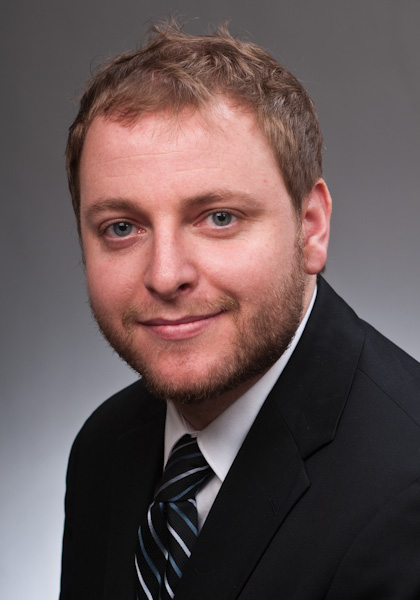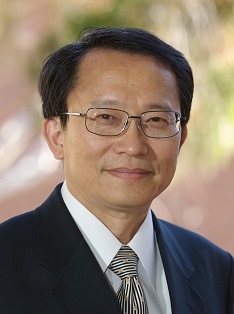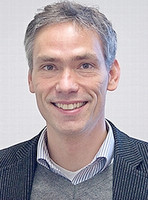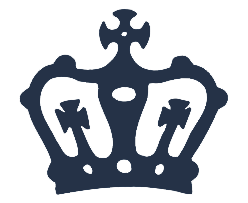|
|
Spring 2015: Upcoming Seminars
|
|
Title:
[SSCS Distinguished Lecture] Silicon-based Circuits and Systems at the Terahertz Frontier
Speaker:
Prof. Dr. rer. nat. Ullrich Pfeiffer, Bergische Universität Wuppertal
Date:
Friday, Apr. 17th, 1:30pm-2:30pm, 750, CEPSR
Title:
Energy-Efficient Digital Hardware and SoC Design: Design and Optimization Techniques
Speaker:
Dr. Dongsuk Jeon, MIT
Date:
Monday, May. 11th, 1:30-2:30pm, 415, CEPSR
|
|
|
|

Ms. Hong Gao
Fujitsu Laboratories Ltd., Kawasaki, Japan
Date:
Friday, Mar. 13th, 1:30pm-2:30pm
Location:
750, CEPSR
|
A 60mV-3V Input Range Boost Converter with Amplitude-Regulated and Intermittently Operating Oscillator for Energy Harvesting
Abstract:
A boost converter that has a wide input-voltage range is presented. The wide range is achieved by an oscillator that can start operations at ultra-low input voltages. Moreover, it uses an amplitude regulation circuit to avoid overvoltage problems and implements a power-down circuit to eliminate the unnecessary power consumption. Experimental results showed that the proposed circuit enabled an input range from 60 mV to 3 V and achieved high power efficiencies. To the best of our knowledge, this is the first time that a boost converter supporting a wide input range from sub-100 mV to several volts has been achieved.
Biography:
Hong Gao received the B.S. degree from China University of Petroleum, Beijing, China, in 2009, and the M.S. degree from Gunma University, Kiryu, Japan, in 2012. In 2012, she joined Fujitsu Laboratories Limited, Kawasaki, Japan, where she has engaged in research on power integrated circuits. Her current research interests include the applications of power management circuits in wireless sensor networks.
|
|

Prof. Joseph Bardin
UMass Amherst
Date:
Friday, Mar. 27th, 1:30pm-2:30pm
Location:
750, CEPSR
|
BiCMOS Circuits For Ultra-Sensitive Scientific Sensor Systems
Abstract:
In a variety of critical scientific fields, the highest performance instrumentation exploits cryogenically cooled electronics to achieve levels of performance far beyond what is feasible using room temperature electronics. For example, the free-space optical communications link—currently under development by NASA for Gbps communication with spacecraft—requires superconducting nanowire single photon detectors (SNSPD) operating at 1 K physical temperature to achieve sufficient earth terminal sensitivity. While much research has been focused on novel device technologies to enable new and more sensitive scientific instrumentation, limited work has focused on the use of semiconductor circuits to optimize the performance of these systems. In this talk, we will describe our research efforts in ultra-sensitive cryogenically cooled SiGe BiCMOS electronics for scalable scientific instruments. The talk will begin with a review of the physical performance limitations of SiGe HBTs at deep cryogenic temperatures (e.g., 4 K) and a discussion of modeling issues encountered by designers targeting this unconventional temperature range. We will then present the design, characterization, and system impact of novel circuits for a variety of applications ranging from THz focal plane arrays for radio astronomy to detector systems for quantum optics.
Biography:
Joseph Bardin received the BS, MS, and PhD degrees in Electrical Engineering from UCSB, UCLA, and Caltech in 2003, 2005, and 2009, respectively. From 2003-2005, he was with the Jet Propulsion Laboratory. In 2010, he joined the department of Electrical and Computer Engineering at the University of Massachusetts Amherst as an Assistant Professor. His research group explores a broad range of topics in the field of high-frequency circuit design ranging from device modeling to the implementation of sophisticated integrated circuits. He is the recipient of a 2011 DARPA Young Faculty Award and a 2014 NSF CAREER Award.
More info. at UMass Amherst Radio Frequency Nanoelectronics Group
|
|

Mau-Chung Frank Chang
Professor/Chairman, Electrical Engineering Department, UCLA
Date:
Monday, Mar. 30th,
Location & Time:
Davis Auditorium, CEPSR, 3:00-4:00pm
See EE Website
|
[EE Distinguished Lecture] Is Terahertz a Communication Waste Land or a Vibrant Frontier?
Abstract:
The infamous "Terahertz Gap" represents frequency spectrum that ranges from 0.3 to 3THz (or 300 to 3000GHz). It lies between traditional microwave and infrared domains but remains "untouchable" via either electronic or photonic means. The conventional "transit-time-limited" electronic devices can hardly operate even at its lowest frequency; the "band-gap-limited" pho- tonic devices on the other hand can only operate beyond its highest fre- quency. Since wavelengths range from 1000 to 100um, Terahertz signals tend to behave quasi-optically and are potentially instrumental for a wide range of scientific and industrial applications. Those include high-data rate, short distance and secured wireless & wireline communications, telemetric and remote sensing based on high-resolution radar, spectrometer and im- agers for intelligent traffic/landing control, safety/security screening and bio-medical/food/drug sensing, and analysis and controls. In this talk, we will discuss fundamental & technical challenges involved in building Tera- hertz systems and progress made recently at UCLA to overcome electronic/photonic barriers for realizing highly integrated (sub)-mm-Wave and Terahertz systems.
Biography:
Dr. Frank Chang is currently the Wintek Chair Professor and Chairman of the Electrical Engineering Department at UCLA. Before joining UCLA in 1997, he was the Assistant Di- rector and Department Manager of the High Speed Electronics Laboratory at the Rock- well Science Center, Thousand Oaks, California (1983-1997). Throughout his career, his research has primarily focused on developing high-speed semiconductor devices and circuits for high-frequency and mixed-signal communication, radar, interconnect and im- aging systems. He was elected to the National Academy of Engineering in 2008 and Aca- demia Sinica (Taiwan, ROC) in 2012. He is an IEEE Fellow and received the IEEE David Sarnoff Award in 2006 for developing and commercializing GaAs HBT power amplifiers for modern wireless communication systems (especially for cell phones).
More info. at UCLA High Speed Electronics Lab
|
|

Prof. Ullrich Pfeiffer
Bergische Universität Wuppertal
Date:
Friday, Apr. 17th, 1:30-2:30pm.
Location:
750, CEPSR
|
[SSCS Distinguished Lecture] Silicon-based Circuits and Systems at the Terahertz Frontier
Abstract:
The push for novel applications in the sub-mmWave region of the electromagnetic spectrum has raised the bar on RF circuit design and characterization. Continued device scaling enables circuits to operate at frequencies so high that contact-less wafer testing (in free space) is the last resort. This talk will summarize this frontier. It follows practical CMOS and SiGe BiCMOS design examples including 0.5 THz high-power oscillators, sub-harmonically operated receivers and transmitters up to 0.8 THz, and broadband direct detectors for active imagers running well beyond 1 THz.
Biography:
Ullrich Pfeiffer received the Ph.D. in physics from the University of Heidelberg, Germany, in 1999. Till 2006 he was with the IBM T.J. Watson Research Center where his research involved RF circuit design and packaging for 60GHz communication. Since 2008 he holds the High-frequency and Communication Technology chair at the University of Wuppertal, Germany. His current research activities include the design of silicon integrated circuits for THz imaging applications. Among other awards, he is the recipient of the 2007 European Young Investigator Award, the co-recipient of the 2004 and 2006 Lewis Winner Award, as well as the 2012 Jan Van Vessem Award at the ISSCC Conference. He is a Senior Member of IEEE, has authored and co-authored 100+ publications and has been the co-inventor of 10+ US and international issued patents, relating to RF, millimeter-wave, terahertz communication/imaging circuits and sensors.
|
|

Dr. Dongsuk Jeon
MIT
Date:
Monday, May. 11th, 1:30-2:30pm.
Location:
415, CEPSR
|
Energy-Efficient Digital Hardware and SoC Design: Design and Optimization Techniques
Abstract:
As CMOS technology has developed considerably in the last few decades, many SoCs have been implemented across different application areas due to reduced area and power consumption. Digital signal processing (DSP) algorithms are frequently employed in these systems to achieve more accurate operation or faster computation. However, CMOS technology scaling started to slow down recently and relatively large systems consume too much power to rely only on the scaling effect while system power budget such as battery capacity improves slowly. In addition, there exist increasing needs for miniaturized computing systems including sensor nodes that can accomplish similar operations with significantly smaller power budget.
Voltage scaling is one of the most promising power saving techniques due to quadratic switching power reduction effect, making it necessary feature for even high-end processors. However, in order to achieve maximum possible energy efficiency, systems should operate in near or sub-threshold regimes where leakage takes significant portion of power.
In this talk, a few key energy-aware design approaches will be described. Considering prominent leakage and larger PVT variability in low operating voltages, multi-level energy saving techniques to be described are applied to key building blocks in mobile applications: architecture study, algorithm-architecture co-optimization, and robust yet low-power memory design. Finally, described approaches are applied to design examples including a visual navigation accelerator, ultra-low power biomedical SoC and face recognition accelerator, resulting in >10x power savings than state-of-the-art.
Biography:
Dongsuk Jeon received a B.S degree in electrical engineering from the Seoul National University, South Korea, in 2009 and a Ph.D. degree in electrical engineering at the University of Michigan, Ann Arbor in 2014. He is currently a postdoctoral associate at the Massachusetts Institute of Technology, where he is designing a versatile 3-D computer vision processor. His research interests include energy efficient signal processing, subthreshold circuit and SoC for mobile applications.
|
|
Spring 2015 Seminars
|
|
A 60mV-3V Input Range Boost Converter with Amplitude-Regulated and Intermittently Operating Oscillator for Energy Harvesting
Speaker:
Ms. Hong Gao, Fujitsu Laboratories Ltd., Kawasaki, Japan
Date:
Friday, Mar. 13th, 1:30pm-2:30pm, 750, CEPSR
BiCMOS Circuits For Ultra-Sensitive Scientific Sensor Systems
Speaker:
Prof. Joseph Bardin, UMass Amherst
Date:
Friday, Mar. 27th, 1:30-2:30pm, 750, CEPSR
[EE Distinguished Lecture] Is Terahertz a Communication Waste Land or a Vibrant Frontier?
Speaker:
Prof. Mau-Chung Frank Chang, University of California, Los Angeles
Date:
Monday, Mar. 30th, 3:00-4:00pm, Davis Auditorium, CEPSR. Detailed info. at EE Website
|
|
|
|
|

